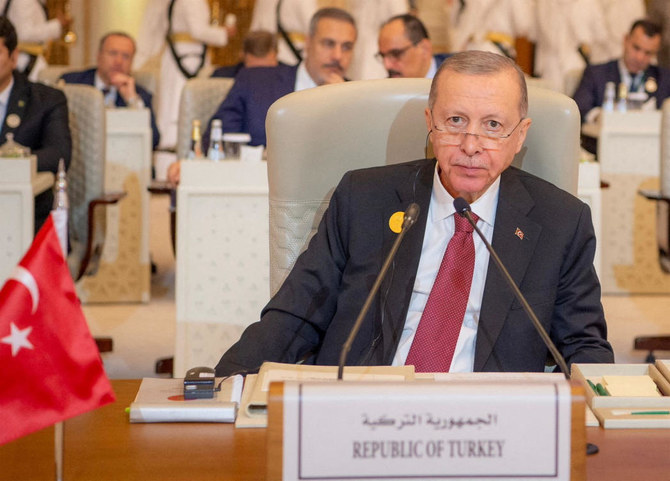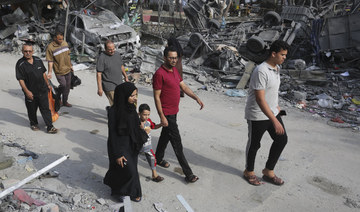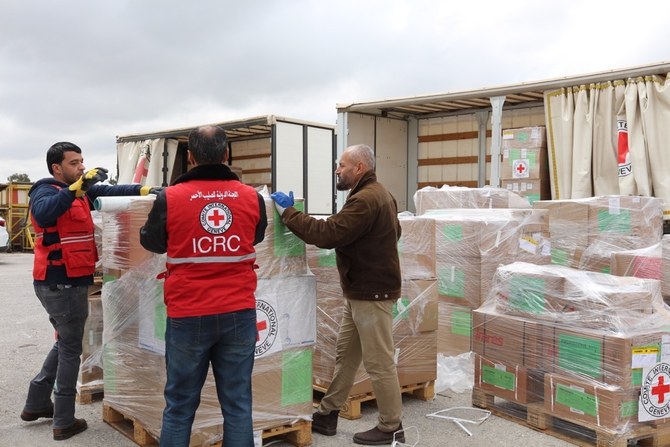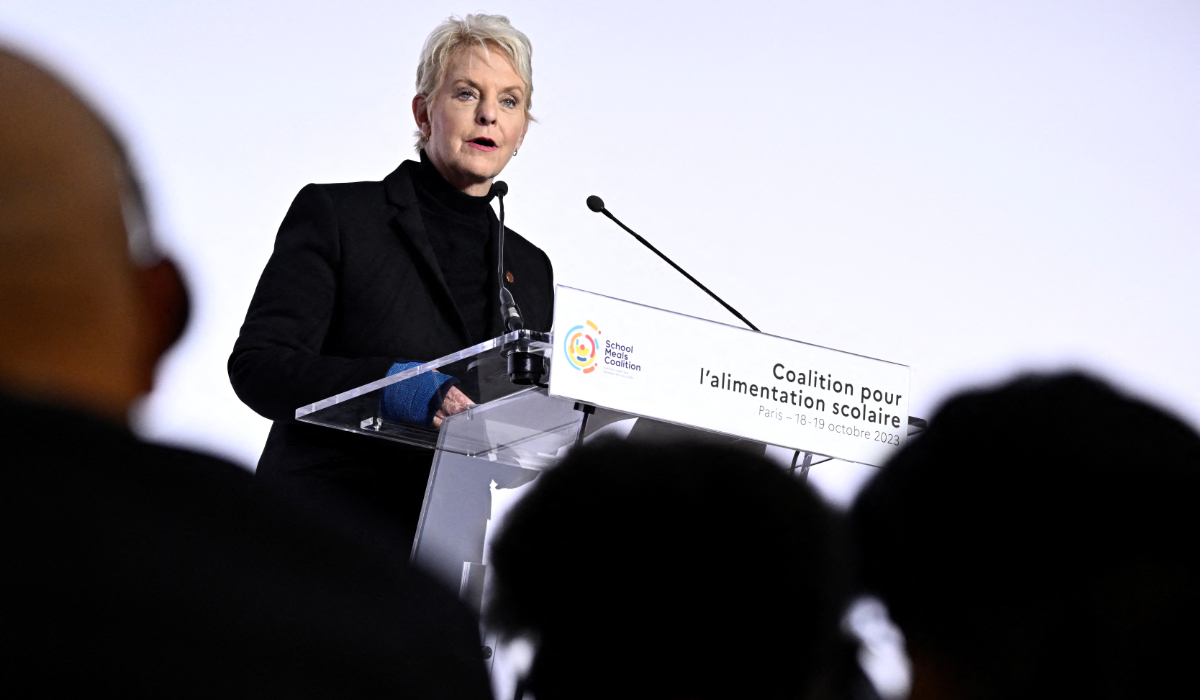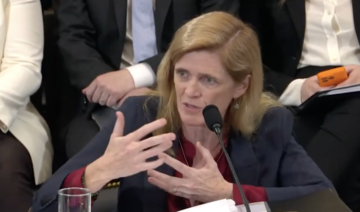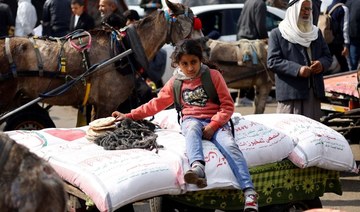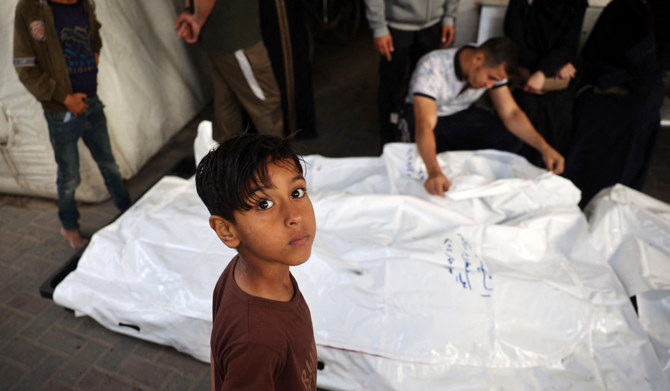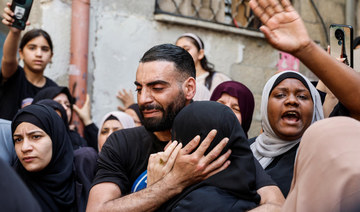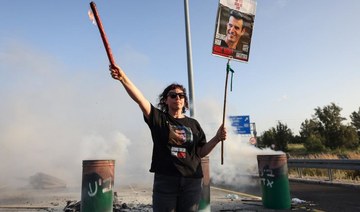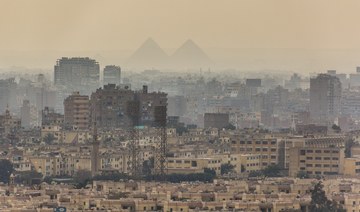ANKARA: Turkish President Recep Tayyip Erdogan said on Wednesday Israel was a “terror state” committing war crimes and violating international law in Gaza, sharpening his repeated criticism of Israeli leaders and their backers in the West.
Speaking two days before a planned visit to Germany to meet Chancellor Olaf Scholz, Erdogan said Israel’s military campaign against Palestinian militant group Hamas included “the most treacherous attacks in human history” with “unlimited” support from the West.
He called for Israeli leaders to be tried for war crimes at the International Court of Justice in The Hague, and repeated his view — and Turkiye’s position — that Hamas is not a terrorist organization but a political party that won past elections.
Britain, the US, EU and some Arab states deem Hamas a terrorist group, unlike Turkiye. Ankara hosts some members of Hamas and supports a two-state solution to the Israeli-Palestinian conflict.
“With the savagery of bombing the civilians it forced out of their homes while they are relocating, it is literally employing state terrorism,” Erdogan said of Israel in parliament. “I am now saying, with my heart at ease, that Israel is a terror state.”
He said: “We will never shy away from voicing the truth that Hamas members protecting their lands, honor, and lives in the face of occupation policies are resistance fighters, just because some people are uncomfortable with it.”
Erdogan’s trip to Germany would be his first to a Western nation since Israel began bombarding Gaza on Oct. 7 in response to Hamas’s attacks.
Germany has expressed strong solidarity with Israel, while urging a focus on limiting the impact of military operations on Gaza’s civilian population.
“The West, namely the US, is unfortunately still seeing this issue backwards,” Erdogan said.
He called on Prime Minister Benjamin Netanyahu to announce whether or not Israel had nuclear weapons, and added that Netanyahu would soon be a “goner” from his post.
He likened the conflict between Israel, a Jewish state, and the Palestinians to a war between the Christian and Muslim worlds, saying the fighting was “a matter of cross and crescent.”
Ankara would take steps to ensure Israeli settlers in occupied Palestinian territories are recognized as “terrorists,” he added.
Spanish Prime Minister Pedro Sanchez urged Israel to end the “indiscriminate killing of Palestinians” in Gaza, in his sharpest criticism of Israel since war against Hamas broke out over a month ago.
“We demand an immediate ceasefire on the part of Israel in Gaza and strict compliance with international humanitarian law, which today is clearly not respected,” he said during a debate in parliament ahead of a vote in confidence on Thursday in which he is poised to be re-appointed for another term.
“Let there be no doubt, we stand with Israel in rejecting and its response to the terrorist attack that this country suffered in October,” the socialist premier added before calling for the “immediate release” of the hostages kidnapped by Hamas.
“But with the same clarity we reject the indiscriminate killing of Palestinians in Gaza and the West Bank,” he said. Shortly after he spoke the leader of far-left party Podemos, acting social rights minister Ione Belarra, reiterated on social media her call for Spain to break diplomatic ties with Israel and impose economic sanctions on the country.
“We need much more than words in an investiture debate to halt the planned genocide that Israel in carrying out in Palestine,” she wrote on X.
Canadian Prime Minister Justin Trudeau said the killing “of women, of children, of babies” in the Israel-Hamas war must stop, sparking a strong rebuke from Israeli leader Benjamin Netanyahu.
“The world is watching, on TV, on social media, we are hearing the testimonies of doctors, family members, survivors, kids who have lost their parents,” Trudeau said at an event in British Columbia province.
“The world is witnessing this killing of women, of children, of babies. This has to stop.”
Netanyahu hit back at Trudeau’s criticism. “It is not Israel that is deliberately targeting civilians but Hamas that beheaded, burned and massacred civilians in the worst horrors perpetrated on Jews since the Holocaust,” Netanyahu posted on X.
Trudeau said Hamas “needs to stop using Palestinians as human shields” and that they “need to release all the hostages immediately and unconditionally.”
Referring to Gaza’s main hospital, which has in recent days become one of the focal points of the Israel-Hamas war, he said: “The human tragedy that is unfolding in Gaza is heart-wrenching, especially the suffering we see in and around the Al-Shifa Hospital.”
Trudeau urged the government of Israel to “exercise maximum restraint.”



